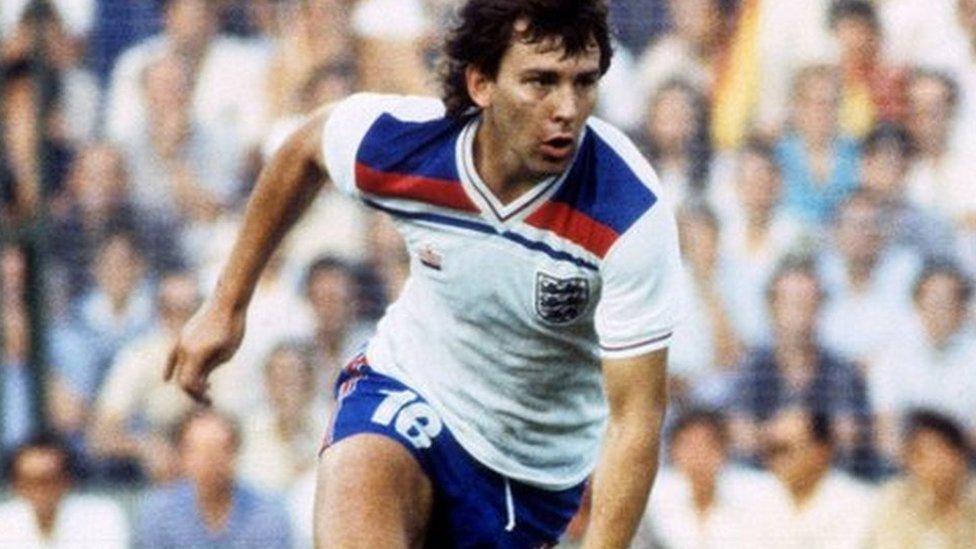How a football fan's collection of memorabilia is helping others
- Published
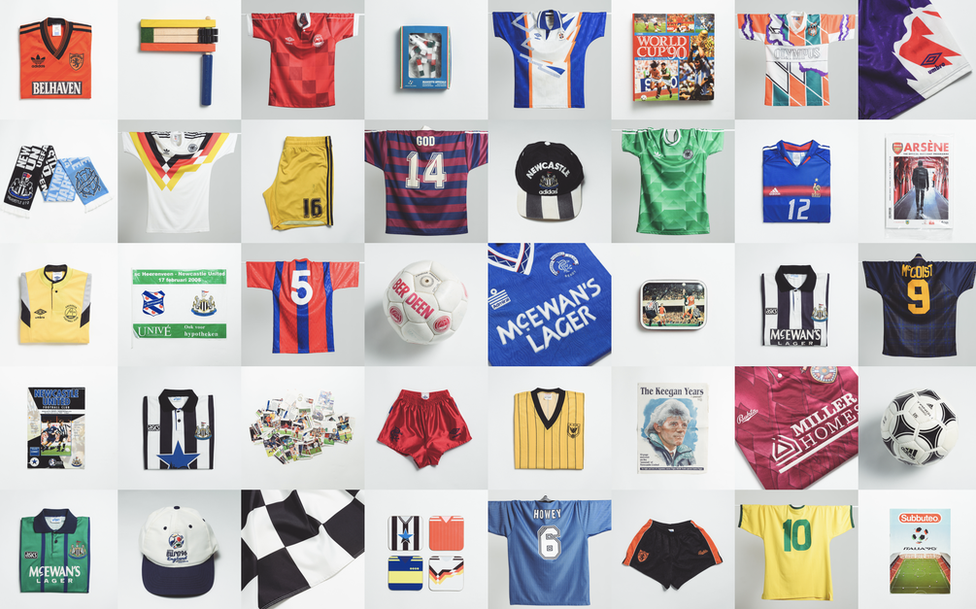
Over more than 30 years, Mike Douglas amassed many hundreds of items of football memorabilia. How has his collection helped others reawaken their fading memories of happier times?
As Paul Gascoigne lifted the ball over a helpless Colin Hendry and drove it low into the corner of the net, Wembley Stadium erupted with jubilation.
The goal - one of England's greatest - would seal victory over the Auld Enemy and transform their Euro 96 fortunes. While teenage Scotland supporter Mike broke down in tears as his heroes were vanquished, his match ticket provided a lasting memory of that hot summer's day and the adventure to London with his dad.
The slip of paper ended up being far from the only reminder of his love for football.
Over the decades, shirts, scarves and books found their way into his collection alongside pennants, programmes and player cards. In all, the 40-year-old estimates he had more than 750 items stowed away.
With the onset of the coronavirus pandemic last year, the "tedium" of lockdown provided an opportunity to root through his treasures "one quiet afternoon with a few beers".
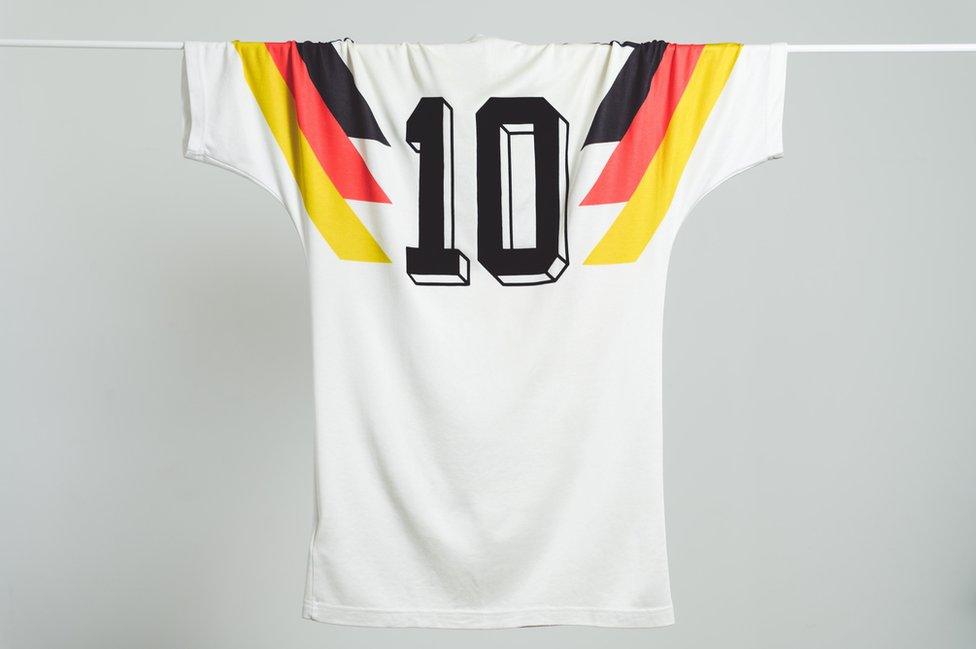
Among Mike's shirts was a replica of the West Germany top worn during their victory at Italia 90
Inspecting them, he says, took him back in time. Among the physical items was something unable to be seen but nonetheless very powerful - the hopes of a football-obsessed youngster who dreamed of taking to the pitch alongside his idols.
"I wasn't collecting consciously," Mike says. "I was just consumed by football from a young age and liked to keep things. I never saw any reason to throw anything away.
"Going through it all, the smell and the feel took me back. There were some red silky Rangers shorts that transported me to the Intersport shop with my dad in the Trinity Centre in Aberdeen with me begging him to buy them for me.
"A lot of the World Cup stuff I loved. I was eight or nine during Italia 90 and hadn't experienced a tournament. It's totally different from the humdrum of a full season. Harking back to that made me realise why I fell in love with the game.
"Also, there was a connection there. My dad hated football yet he took me to the Scottish Cup final. He sat on a bus for four hours to Glasgow, so he cared. He cared about me. That was nice to think about."
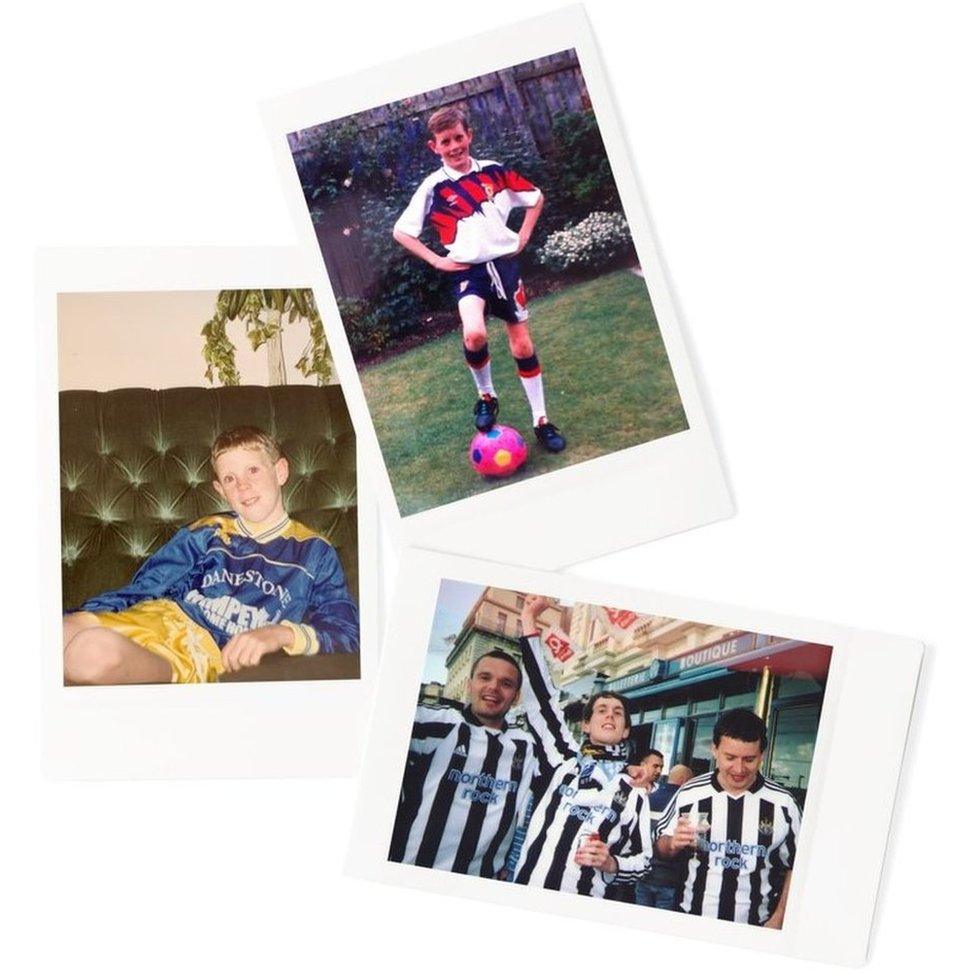
A series of snaps charting Mike's life as a football fan
The items traced a link from Mike's early years in Aberdeen through to the love of Newcastle United he developed as a teenager, when his family would return to their former home of the north-east of England for their holidays. Later, having moved to London in his 20s, he would follow the team's exploits at away games.
Experiencing a rush of emotion as he examined each box of memorabilia, he was left with an altogether different feeling - what should he do with his collection?
"I've kind of fallen out of love with football," Mike says. "VAR, all the drama with the Newcastle ownership, turning 40, being a dad, lockdown. It was all those things.
"And I thought I was never going to be able to open up to new experiences if I'm being pulled back into the 1980s and 90s."
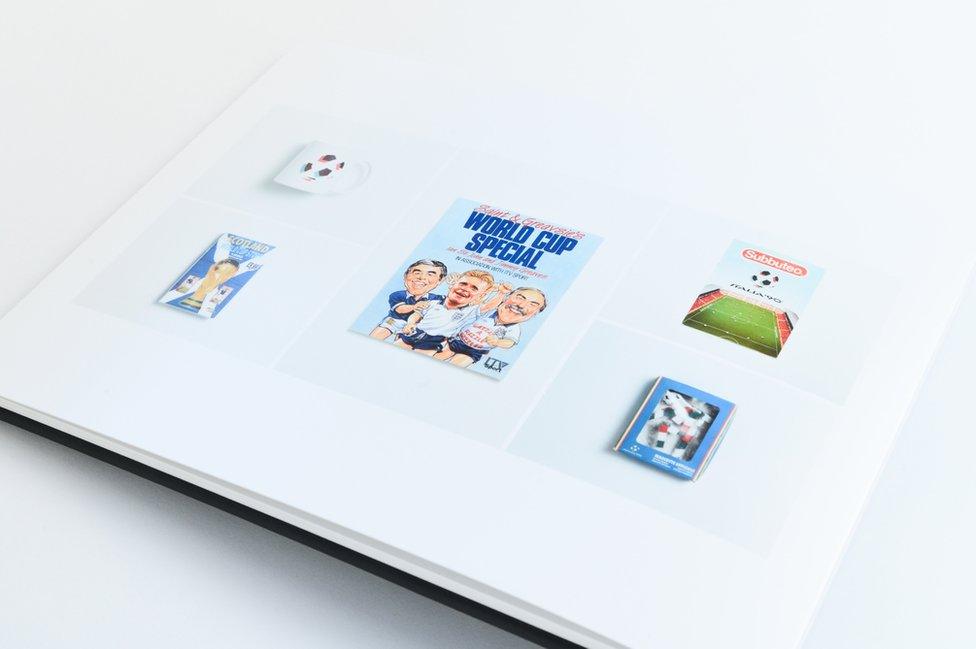
Mike's book includes about 250 of his favourites items
He considered displaying some of the items in a "man-shed with a bar" at the bottom of his garden, or donating the whole collection to the National Football Museum in Manchester, before coming up with a different solution.
In a nod to the Premier League's efforts to get a virus-disrupted 2019-20 season back under way, the graphic designer, who now lives in Whitstable, Kent, created a single-copy book and website, external named Project Restart.
"Going through it during lockdown was the trigger. I thought: 'Do I shove this back into boxes and look at it again in 15 years' time? What is it for?' I didn't quite know what the purpose of keeping it all was.
"I thought it was such such a waste being packed away. I want a nice, indulgent coffee-table book that I've designed and that can be a talking point with friends when they come round. Then I thought loads of people would enjoy it, so I put it online."
With his favourite pieces photographed for posterity, Mike decided to take a further step.
Having become aware of the Sporting Memories Foundation Scotland (SMFS) and Football Memories Scotland, he donated several boxes of his collection to the two charities, which help older adults living with dementia or experiencing loneliness and social isolation.
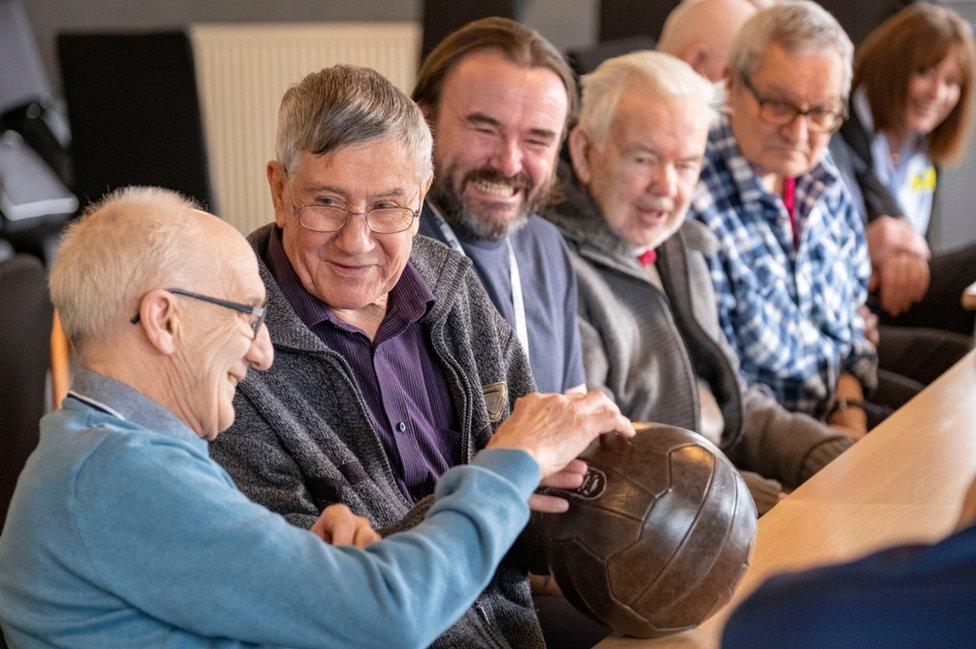
The Sporting Memories Foundation uses memorabilia to spark conversation
Maurice Donohue, chief operating officer at SMFS, welcomes the contributions as a "fantastic resource" now helping people to reconnect with their past through their love of the sport.
"Along with the physical collection of football memorabilia, Mike's website provides a treasure trove of images that can be used at our clubs by our volunteers.
"This type of resource can help people connect with their past, reawaken positive memories, aid reminiscence and provide a route into wider conversations."
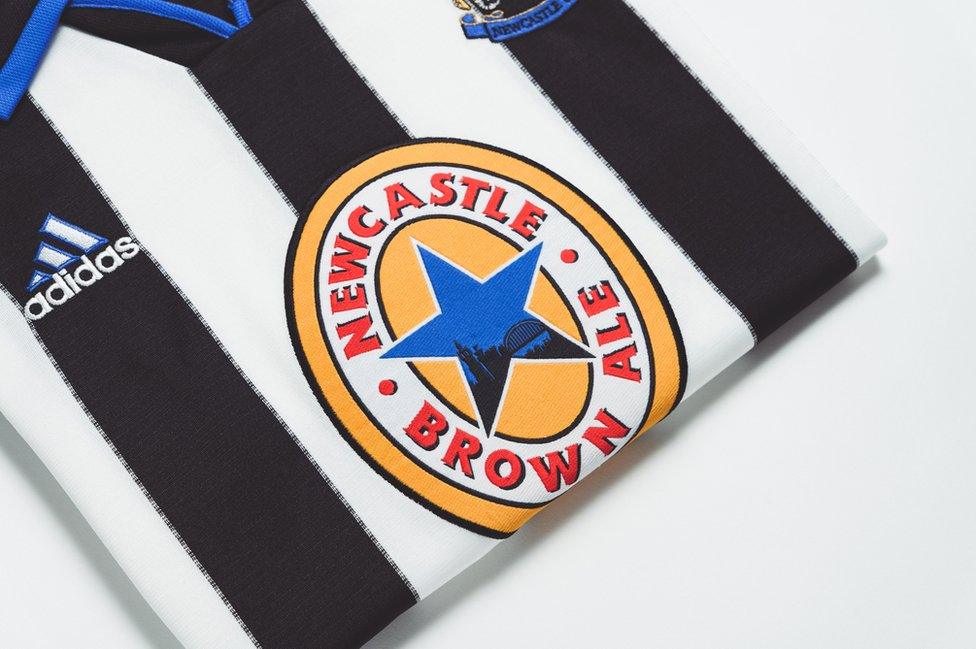
Several of Newcastle United's famous black-and-white jerseys made their way into Mike's collection
Seeing the charities' sessions online, father-of-two Mike was "welling up" with tears.
"They have some tea and biscuits and pick a year, have a little slideshow and go through a season month by month. The talk is about football matches, but also who was in the charts, who was the prime minister.
"I know how much touch and smell took me back in time, so I can only imagine what it must be like for people with dementia to go there and have these things stimulate them and remind them of good times."

The power of nostalgia
Dr Joan Harvey, a chartered psychologist at Newcastle University, says nostalgia evokes a sense of time and place - reminding people of happy days and making them feel good.
"By and large it is a positive emotion, although it can occasionally include some feelings like a sense of loss or longing for those earlier times.
"Having produced a book, Mr Douglas has turned his nostalgia into something more manageable and removed the burden of the responsibility he had looking after all those items and finding somewhere to keep them."
For some dementia patients, nostalgia's effect is "especially powerful", Dr Harvey says, because discussions of fondly recalled times can act as cues and prompts,
"Many people with dementia are not able to remember what they were doing a few hours or even minutes ago, yet their long-term memory is still working reasonably well so reminding them of what is in it is a good thing."

The two charities were not the only beneficiaries of Mike's collection.
He auctioned a number of items to pay for kit and equipment for his Aberdeen primary school side, the Danestone Dynamos, even designing their new strip and updating the team crest.
For Mike, his own Project Restart acted as a "physical and mental cleansing".
And while delighted to have helped some worthy causes, he is also pleased to have found a way to mark his time as a football fan.
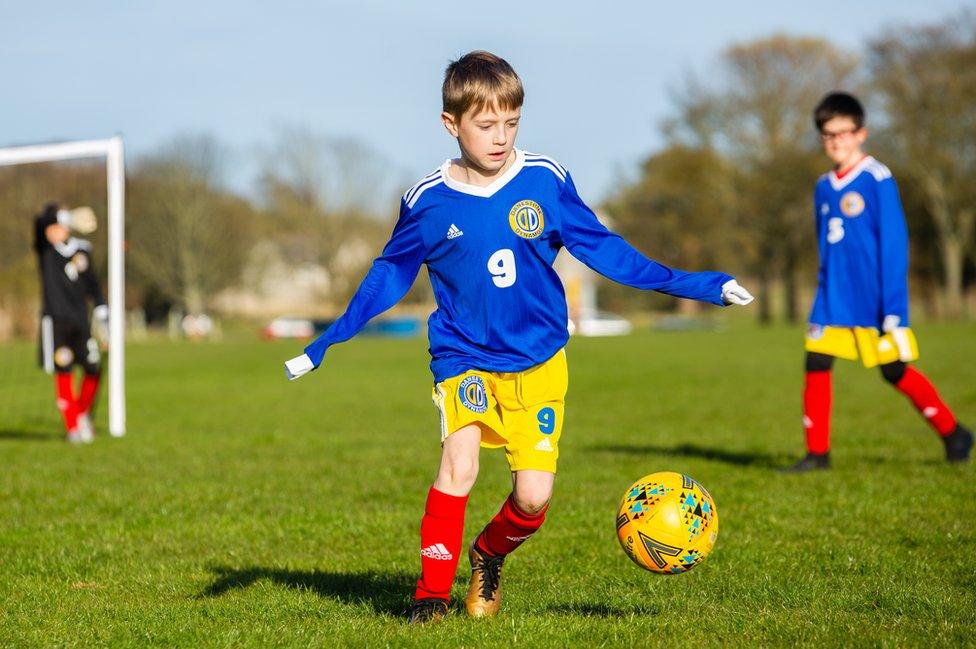
Mike's former school team, the Danestone Dynamos, now wear the kit he redesigned
"You buy a house and have a housewarming and people come round. Forty years later, you pay your mortgage off and you get a little envelope that says 'no more payments'.
"There's no celebratory moment and I wanted that. I wanted to say, 'I gave football my life for more than 30 years', and rather than being bitter about giving it up, I wanted to celebrate that time.
"I might not be into football with the same reverence as before, but I've got a tangible thing to show my mates and kids."
A quarter of a century on from his childhood visit to Wembley, Mike was there again last month as Scotland and England met in the delayed Euro 2020 tournament.
As before, he took in the atmosphere around a fan-packed Trafalgar Square before heading to the stadium. It was "a nice moment, going full circle", although he wonders if it might be his "last hurrah".
"My son plays football on Saturdays so I think there'll always be elements of it in my life, but I don't have a season ticket any more. I don't go to the pub to watch games, and if Newcastle lose I'm not still annoyed about it on the Monday.
"I feel like I'm handing the baton over to someone else."
- Published15 June 2021
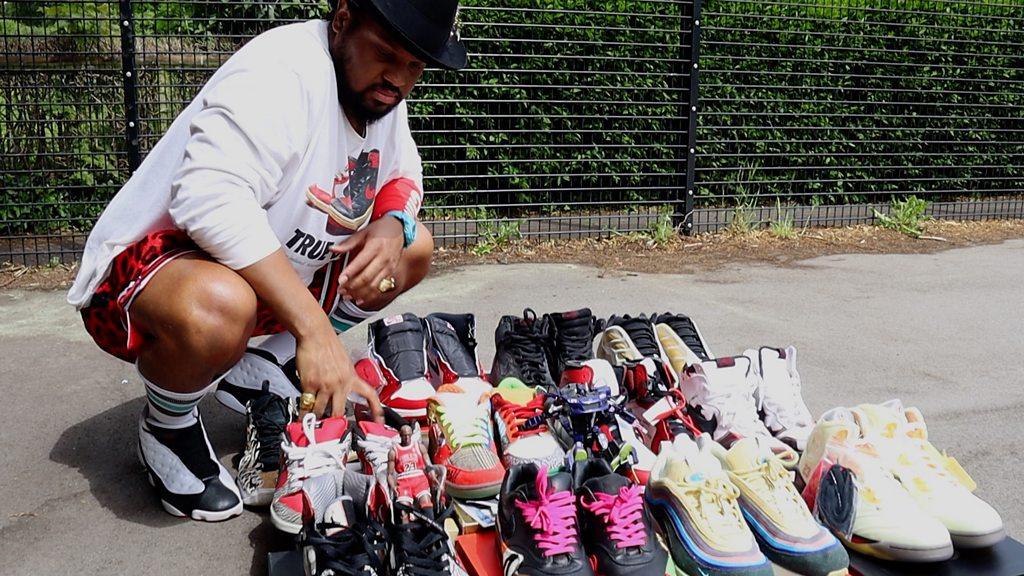
- Published3 June 2020
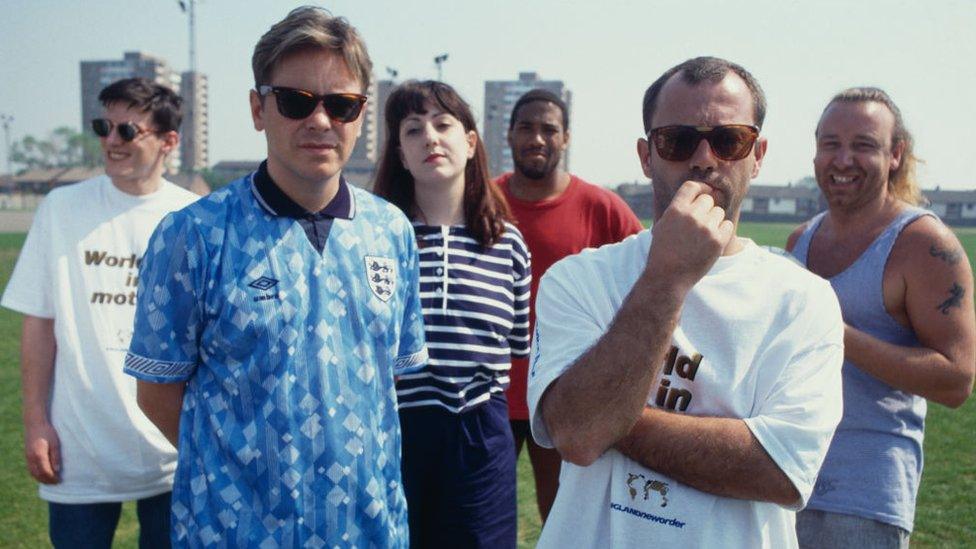
- Published13 May 2020
